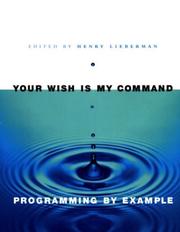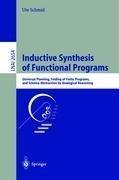| Listing 1 - 3 of 3 |
Sort by
|

ISBN: 1281071773 9786611071776 0080521452 0585456577 1558606882 9780585456577 9781558606883 9780080521459 9781281071774 6611071776 Year: 2001 Publisher: San Francisco Morgan Kaufmann Publishers
Abstract | Keywords | Export | Availability | Bookmark
 Loading...
Loading...Choose an application
- Reference Manager
- EndNote
- RefWorks (Direct export to RefWorks)
As user interface designers, software developers, and yes-as users, we all know the frustration that comes with using ""one size fits all"" software from off the shelf. Repeating the same commands over and over again, putting up with an unfriendly graphical interface, being unable to program a new application that you thought of yourself-these are all common complaints. The inflexibility of today's computer interfaces makes many people feel like they are slaves to their computers. Shouldn't it be the other way around? Why can't technology give us more ""custom-fitting"" software?
Computer programming. --- Computers --- Electronic computer programming --- Electronic data processing --- Electronic digital computers --- Programming (Electronic computers) --- Programming --- Coding theory --- Programming by example (Computer science) --- Demonstration, Programming by (Computer science) --- Demonstrational programming (Computer science) --- Examples, Programming by (Computer science) --- Inductive program synthesis (Computer science) --- Inductive synthesis (Computer science) --- Input/output examples, Programming by (Computer science) --- PBD (Programming by demonstration) --- PBE (Programming by example) --- Program synthesis, Inductive (Computer science) --- Programming by demonstration (Computer science) --- Programming by examples (Computer science) --- Programming by input/output examples (Computer science) --- Programming by teaching (Computer science) --- Programming, Demonstrational (Computer science) --- Teaching, Programming by (Computer science) --- Machine learning
Book
ISBN: 1849692351 9781849692359 9781849692342 1849692343 Year: 2013 Publisher: Birmingham : Packt Publishing,
Abstract | Keywords | Export | Availability | Bookmark
 Loading...
Loading...Choose an application
- Reference Manager
- EndNote
- RefWorks (Direct export to RefWorks)
This book follows an example-driven, simplified, and practical approach to using OpenCL for general purpose GPU programming.If you are a beginner in parallel programming and would like to quickly accelerate your algorithms using OpenCL, this book is perfect for you! You will find the diverse topics and case studies in this book interesting and informative. You will only require a good knowledge of C programming for this book, and an understanding of parallel implementations will be useful, but not necessary.
OpenCL (Computer program language) --- Parallel programming (Computer science) --- Programming by example (Computer science) --- Open CL (Computer program language) --- Open Computing Language (Computer program language) --- Programming languages (Electronic computers) --- Demonstration, Programming by (Computer science) --- Demonstrational programming (Computer science) --- Examples, Programming by (Computer science) --- Inductive program synthesis (Computer science) --- Inductive synthesis (Computer science) --- Input/output examples, Programming by (Computer science) --- PBD (Programming by demonstration) --- PBE (Programming by example) --- Program synthesis, Inductive (Computer science) --- Programming by demonstration (Computer science) --- Programming by examples (Computer science) --- Programming by input/output examples (Computer science) --- Programming by teaching (Computer science) --- Programming, Demonstrational (Computer science) --- Teaching, Programming by (Computer science) --- Machine learning --- Computer programming --- Parallel processing (Electronic computers) --- Paraelle programming (Computer science) --- OpenCL (Langage de programmation) --- Programmation (Informatique)

ISBN: 3540401741 3540448462 Year: 2003 Publisher: Berlin, Heidelberg : Springer Berlin Heidelberg : Imprint: Springer,
Abstract | Keywords | Export | Availability | Bookmark
 Loading...
Loading...Choose an application
- Reference Manager
- EndNote
- RefWorks (Direct export to RefWorks)
Because of its promise to support human programmers in developing correct and efficient program code and in reasoning about programs, automatic program synthesis has attracted the attention of researchers and professionals since the 1970s. This book focusses on inductive program synthesis, and especially on the induction of recursive functions; it is organized into three parts on planning, inductive program synthesis, and analogical problem solving and learning. Besides methodological issues in inductive program synthesis, emphasis is placed on its applications to control rule learning for planning. Furthermore, relations to problem solving and learning in cognitive psychology are discussed.
Computer programming --- Software engineering --- Artificial intelligence --- Computer Science --- Engineering & Applied Sciences --- Computer programming. --- Software engineering. --- Artificial intelligence. --- AI (Artificial intelligence) --- Artificial thinking --- Electronic brains --- Intellectronics --- Intelligence, Artificial --- Intelligent machines --- Machine intelligence --- Thinking, Artificial --- Computer software engineering --- Computers --- Electronic computer programming --- Electronic data processing --- Electronic digital computers --- Programming (Electronic computers) --- Programming --- Computer science. --- Science. --- Computer logic. --- Mathematical logic. --- Computer Science. --- Artificial Intelligence (incl. Robotics). --- Science, general. --- Programming Techniques. --- Software Engineering. --- Logics and Meanings of Programs. --- Mathematical Logic and Formal Languages. --- Bionics --- Cognitive science --- Digital computer simulation --- Logic machines --- Machine theory --- Self-organizing systems --- Simulation methods --- Fifth generation computers --- Neural computers --- Engineering --- Coding theory --- Programming by example (Computer science) --- Demonstration, Programming by (Computer science) --- Demonstrational programming (Computer science) --- Examples, Programming by (Computer science) --- Inductive program synthesis (Computer science) --- Inductive synthesis (Computer science) --- Input/output examples, Programming by (Computer science) --- PBD (Programming by demonstration) --- PBE (Programming by example) --- Program synthesis, Inductive (Computer science) --- Programming by demonstration (Computer science) --- Programming by examples (Computer science) --- Programming by input/output examples (Computer science) --- Programming by teaching (Computer science) --- Programming, Demonstrational (Computer science) --- Teaching, Programming by (Computer science) --- Machine learning --- Logic design. --- Artificial Intelligence. --- Science, Humanities and Social Sciences, multidisciplinary. --- Design, Logic --- Design of logic systems --- Digital electronics --- Electronic circuit design --- Logic circuits --- Switching theory --- Informatics --- Science --- Algebra of logic --- Logic, Universal --- Mathematical logic --- Symbolic and mathematical logic --- Symbolic logic --- Mathematics --- Algebra, Abstract --- Metamathematics --- Set theory --- Syllogism --- Computer science logic --- Logic, Symbolic and mathematical --- Logic, Symbolic and mathematical.
| Listing 1 - 3 of 3 |
Sort by
|

 Search
Search Feedback
Feedback About UniCat
About UniCat  Help
Help News
News